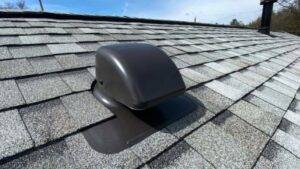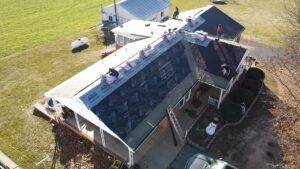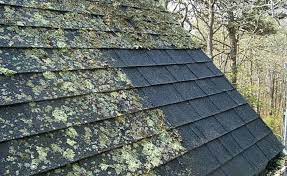When it comes to your home, the roof plays a crucial role in protecting your investment and providing shelter from the elements. But do you fully understand the warranties that come with your roofing materials and installation? In this blog post, we’ll delve into the world of understanding roof warranties, explaining their importance, the different types available, and how to maintain and protect your warranty coverage.
Short Summary
- Roof warranties are essential for protecting against material defects, installation errors and financial security.
- Choose a reputable roofing contractor who offers a written warranty to protect your investment in a new roof.
- Understand the details of your warranty to ensure adequate coverage and avoid surprises.
The Importance of Roof Warranties
Roof warranties are essential for safeguarding your investment in a new roof, providing protection against material defects, installation errors, and financial security. By understanding the guarantees and limitations of your new roof’s warranty, you can ensure that you are adequately protected against potential issues, mitigating risks, and enjoying peace of mind.
It is important to read the warranty carefully and understand the coverage it provides. Make sure to read the fine print.
Protecting Your Investment
A basic limited lifetime warranty offers protection for your investment in a new roof by guaranteeing coverage for repairs or replacements resulting from defects or faulty workmanship. This type of warranty is typically included in most roofing warranties and offers a certain level of assurance for homeowners. However, it’s important to note that warranties can vary, with some covering only material defects while others, like a roof replacement warranty, extend to workmanship errors as well.
To ensure the best protection for your investment, it’s crucial to choose a reputable roofing contractor who provides a written warranty and is comfortable with the terms before proceeding with the project. Additionally, homeowners should inquire about the standard warranty coverage, availability of extended warranties, and their associated costs, as well as any limitations of the workmanship warranty before making a decision.
Mitigating Risks
Roof warranties, including roofing warranty, play a vital role in minimizing risks associated with roofing projects, such as roof replacement, by providing coverage against unexpected repair costs and potential damage to your property. A roof workmanship warranty generally covers any flaws in the roofing system’s installation, like incorrectly installed flashing or inadequate ventilation, as well as any issues related to the materials used, including leaks or the premature failure of shingles.
By partnering with a roofing contractor that offers a warranty, you can ensure that any mistakes made during the installation process are covered, and your roof is protected for a prolonged period. Regular inspections enable contractors to identify potential issues before they become severe and financially guarantee their work. This not only minimizes the risk of unexpected repair costs, but also helps maintain the overall integrity and durability of your roof.
Peace of Mind
Roof warranties provide peace of mind for homeowners by offering protection against poor workmanship or installation, ensuring that the roof is built to last. Knowing that your investment is protected and that any issues will be addressed without incurring additional costs allows you to feel confident in your choice of roofing contractor and materials.
Furthermore, understanding the types of warranties available – manufacturer warranties, workmanship warranties, and extended warranties – and their specific coverage details empowers you to make informed decisions about your roofing project.
Types of Roof Warranties: A Detailed Overview
To help you navigate the world of roof warranties, let’s dive into the three primary types available to homeowners: manufacturer warranties, workmanship warranties, and extended warranties. Each type offers different levels of coverage and protection for your roofing project, so it’s essential to understand the details and distinctions between them to ensure you choose the best warranty for your needs.
Manufacturer warranties are typically provided by the roofing material manufacturer and cover defects in the material.
Manufacturer Warranties
Manufacturer warranties cover any defects in the roofing materials, ensuring that your investment is protected from issues related to material quality. The duration of a manufacturer or roof shingle warranty typically ranges from 20 to 50 years, depending on the material and manufacturer. However, it’s important to note that these warranties may only provide coverage if the materials were installed correctly and in accordance with the manufacturer’s specifications.
As a homeowner, it’s vital to thoroughly assess the provisions of the manufacturer’s warranty before acquiring roofing materials. This will help you understand any requirements or conditions that must be met for the warranty to be valid, such as employing certified contractors for the installation or adhering to specific installation guidelines.
Workmanship Warranties
Workmanship warranties, on the other hand, cover the installation process of the product, providing coverage for any defects resulting from faulty workmanship. The duration of a workmanship warranty varies, typically ranging from 2 to 25 years depending on the warranty selected and the contractor providing it. It is essential to choose a roofing contractor that offers a workmanship warranty, as it guarantees professional installation, which is a key element of new roofing.
When selecting a roofing contractor, it’s important to ask about the specifics of their workmanship warranty. Some questions to consider asking include:
- What errors are covered under the warranty?
- Are labor costs included in the warranty?
- Are there any associated costs for receiving services under the warranty?
Ensuring that your contractor provides a comprehensive workmanship warranty can help protect your investment and provide peace of mind for years to come.
Extended Warranties
Extended warranties are optional and provide additional coverage beyond the manufacturer and workmanship warranties. These warranties cover the entire roofing system, with the manufacturer agreeing to pay for a complete replacement if any of the components fail. Auxiliary materials that are not included are flashing, fasteners and wood decking. Extended warranties can offer added protection for homeowners who plan on remaining in their home for a longer period and require assurance of coverage.
Before purchasing an extended warranty, it’s important to carefully review the specifications, such as coverage and pricing, to determine if it’s the right choice for your needs. Additionally, some extended warranties may require certain components to be installed or specific conditions to be met, so it’s essential to understand these requirements before committing to a warranty plan.
Common Exclusions and Limitations in Roof Warranties
While roof warranties offer valuable protection for your investment, it’s important to recognize that they often come with exclusions and limitations that can impact your coverage. Certain roof warranties may contain exclusions or limitations that restrict coverage, such as damage caused by storms or natural disasters, improper maintenance, or damage resulting from pre-existing conditions.
To ensure that you are adequately protected and aware of any potential gaps in coverage, it’s essential to familiarize yourself with the details outlined in your warranty. By understanding these exclusions and limitations, you can take the necessary steps to maintain your warranty coverage and address any issues that may arise during the warranty period.
How to Maintain and Protect Your Roof Warranty
Maintaining and protecting your roof warranty is crucial to ensure continued coverage and peace of mind throughout the lifespan of your roof. Here are some steps you can take to uphold the validity of your warranty.
- Understand the fine print of your warranty.
- Register your warranty with the manufacturer or roofing company.
- Work with a reliable contractor for installation and repairs.
- Conduct regular inspections and maintenance to identify and address any issues promptly and effectively.
By following these steps, you can ensure that your roof warranty remains valid and that any potential problems are taken care of in a timely manner.
Taking the time to understand the details of your warranty and following the steps outlined above will help you understand the details of your warranty.
Understanding the Fine Print
It’s essential to thoroughly read and understand the terms and conditions of your roof warranty, including any specific requirements or exclusions that may impact your coverage. For example, some warranties may require the use of certified contractors for installation or adherence to specific installation guidelines to maintain coverage.
By being aware of these details and ensuring that they are met, you can help protect your warranty coverage and avoid any surprises down the line.
Registering Your Warranty
Registering your roof warranty is an essential step in initiating your warranty coverage. The process for registering your warranty may vary depending on the manufacturer or contractor, but it’s important to follow the provided instructions and complete any required forms or documentation within the specified time frame.
By registering your warranty promptly and accurately, you can ensure that your coverage is active and valid, providing you with peace of mind and protection for your roofing investment.
Consistent Contractor Collaboration
To maintain your roof warranty, it’s important to consistently work with the same roofing contractor for maintenance and repairs. This ensures that the contractor is familiar with your roofing system and can effectively address any issues that may arise during the warranty period.
Additionally, working with a reliable contractor who is certified by the manufacturer can help ensure that your installation adheres to the manufacturer’s specifications and requirements, further protecting your warranty coverage.
Regular Inspections and Maintenance
Scheduling routine inspections and maintenance with your roofing contractor is crucial for maintaining the integrity and durability of your roof, as well as upholding your warranty coverage. Regular inspections allow your contractor to identify potential issues before they become severe, ensuring that any necessary repairs are addressed promptly and effectively.
By adhering to a consistent inspection and maintenance schedule, you can help protect your warranty coverage and prolong the life of your roof.
How to Choose the Best Roof Warranty for Your Needs
Selecting the best roof warranty for your needs depends on factors such as coverage, duration, and transferability. Understanding the differences between manufacturer warranties, workmanship warranties, and extended warranties can help you make an informed decision that offers the best protection for your investment. It’s important to compare the warranties offered by different manufacturers and contractors, as well as any associated costs or requirements, to ensure you’re getting the most comprehensive coverage for your specific needs.
When evaluating roof warranties, consider the types of materials being used, the installation process, and any potential exclusions or limitations that may impact your coverage. By taking the time to research and compare warranties, you can choose the best option for your roofing project and enjoy peace of mind knowing that your investment is protected.
Asphalt Shingle Warranties: A Closer Look
Asphalt shingles are a popular choice for homeowners due to their durability and affordability. Leading asphalt shingle manufacturers, such as GAF and Owens Corning, offer warranties that cover the materials and workmanship of the shingles, providing homeowners with added protection for their investment. The length of warranties for asphalt shingles can vary, with three-tab shingles typically having shorter warranties than architectural shingles.
Before selecting an asphalt shingle warranty, it’s essential to ensure that your roofing contractor is certified to install the specific products offered by the manufacturer, as warranties may not be honored if the materials are installed by an uncertified contractor. By choosing a certified contractor and understanding the coverage details and limitations of the warranty, you can make an informed decision and protect your investment in your new asphalt shingle roof.
Summary
Understanding roof warranties is crucial for homeowners and property owners to protect their investments, mitigate risks, and enjoy peace of mind. By familiarizing yourself with the different types of warranties available, such as manufacturer, workmanship, and extended warranties, and taking the necessary steps to maintain and protect your warranty coverage, you can ensure that your roof is built to last and any issues are promptly addressed. With the right warranty in place, you can feel confident in your choice of roofing contractor and materials, knowing that your investment is protected for years to come.
Frequently Asked Questions
What is the typical warranty on a new roof?
The typical warranty on a new roof is 25-30 years, though there are some options for 50 year and “lifetime” coverage.
These longer warranties can provide peace of mind for homeowners, as they can be sure that their roof will be covered for a longer period of time.
What does a 50 year roof warranty mean?
A 50-year roof warranty covers leaks caused by material defects, meaning the manufacturer will cover some costs for repair or replacement if your roof develops a leak due to defective shingle material.
This type of warranty is a great way to protect your investment and ensure that your roof will last for many years to come.
What are the three primary types of roof warranties?
The three primary types of roof warranties are manufacturer warranties, workmanship warranties and extended warranties, offering protection for a variety of roofing needs.
Manufacturer warranties cover the materials used in the roof, while workmanship warranties cover the labor involved in the installation. Extended warranties provide additional coverage for a longer period of time.
What is covered under a roof workmanship warranty?
A roof workmanship warranty typically covers any flaws in installation and issues related to the materials used, such as leaks or premature shingle failure.
What are some common exclusions and limitations typically found in roof warranties?
Common exclusions and limitations found in roof warranties include damage resulting from natural disasters, improper maintenance, and pre-existing conditions.
These exclusions and limitations are important to understand when considering a roof warranty. Knowing what is and isn’t covered can help you make an informed decision about the warranty that is best for your needs.






